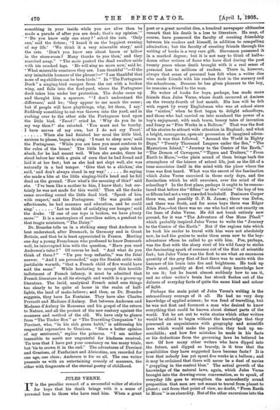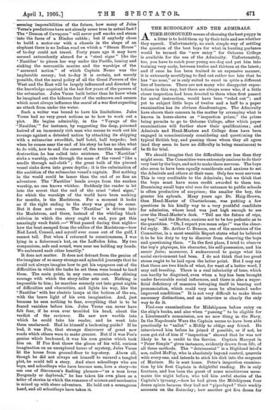J T is the peculiar reward of a successful writer of
stories for boys that his death brings with it a sense of personal loss to those who have read him. When a great
course, have possessed the faculty of creating friendship
between his readers and himself, in addition to compelling admiration; but the faculty of creating friends through the
writing of books is a very rare gift. Stevenson possessed it in a marked degree; but it is not easy to think of half-a- dozen other writers of fame who have died during the past twenty years whose death brought with it a real sense of personal loss to millions of readers. There is, however, always that sense of personal loss felt when a writer dies who made friends with his readers first in the nursery and the schoolroom. Because be has given pleasure to the boy, he remains a friend to the man.
No writer of books for boys, perhaps, has made more friends than Jules Verne, whose death occurred at Amiens on the twenty-fourth of last month. His loss will be felt with regret by every Englishman who was at school since the "sixties," when he first began to delight schoolboys, and those who bad carried on into manhood the power of a boy's enjoyment, with such brave, breezy tales of invention and fancy as "Five Weeks in a Balloon." That was the first of his stories to attract wide attention in England; and what a bright, courageous, open-air procession of imagined adven- tures it was that followed. "Around the World in Eighty Days," "Twenty Thousand Leagues under the Sea," "The Mysterious Island," "Journey to the Centre of the Earth," "The Demon of Cawnpore," "Tigers and Traitors," "From Earth to Moon,"—the plain sound of them brings back the atmosphere of the leisure of school life, just as the lilt of a tune associates itself in the mind with the place where the tune was first heard. What was the secret of the fascination which Jules Verne exercised in those early days, and the fascination which he still exercises, over the mind of the schoolboy ? In the first place, perhaps it ought to be remem- bered that before the " fifties " or the" sixties" the boy of ten or fifteen had not a very crowded bookshelf. Fenimore Cooper there was, and possibly G. P. R. James ; there was Defoe, and there was Scott, and for some boys there was Edgar Allan Poe,—but there was no one who had set out exactly on the lines of Jules Verne. He did not break entirely new ground, for it was "The Adventure of One Hans Pfaall " which probably inspired Jules Verne to write the "Journey to the Centre of the Earth." But if the regions into which he took his reader to travel with him were not absolutely new, he had the genius to make them seem new to the boy- adventurer atom he called to go with him. Poe, perhaps, was the first with the sharp steel of his wild fancy to strike the fascinating spark of romance out of the flint of scientific fact ; but Jules Verne was the first to see what an enormous quantity of the grey flint of fact there was to smite with the hammer of his brain into fire and brightness. He took up Poe's steel, possibly at first without deep knowledge how to use it; but he learnt almost suddenly how to use it, and no other writer's brain has struck flashes out of the dulness of everyday facts of quite the same kind and colour of light.
Perhaps the main point of Jules Verne's writing is the extraordinary courage of it all. He had no very deep knowledge of applied science; he was fond of travelling, but he was not first and foremost a man who desired to know everything that could be known about distant parts of the world. Yet he set out to write stories which other writers would be afraid to begin without the knowledge that they possessed an acquaintance with geography and scientific laws which would make the position they took up un- assailable; and how few mistakes be made in his facts or his deductions from the governing laws he believed he saw. Of bow many other writers who have dipped into the future, and dipped so bravely, is it true that the possibilities they have suggested have become facts ? It is true that nobody has yet spent five weeks in a balloon ; and it may be ordained that there will never be a duel of navies "grappling in the central blue." The actual growth of the knowledge of the natural laws, again, which Jules Verne brought into the drawing-room conversation, so to speak, of everyday life goes to strengthen the antecedently sound proposition that men are not meant to travel from planet to planet ; and from that point of view, no doubt, "From Earth to Moon" is an absurdity. But of the other excursions into the seeming impossibilities of the future, how many of Jules ' Verne's predictions have not already come true in actual fact ? The" Demon of Cawnpore " will never puff smoke and steam 'into- the faces of a Hindoo rabble ; but if anybody chose to build a motor-car with a chassis in the shape of an elephant there is no Indian road on which a "Steam House" of to-day could not travel. Forty years ago it may have seemed antecedently absurd for a "steel cigar" like the '
Nautilus' to pierce her way under the Pacific, laming and sinking the mercantile marine and the warships of the " accursed nation" of which Captain Nemo was the implacable enemy; but to-day it is certain, not merely 'possible, that the naval policy of all the Great Powers of the West and the East will be largely influenced and directed by the knowledge acquired in the last few years of the powers of • the submarine. Jules Verne built better than he knew when he imagined out the hideous fear of the unknown and unseen which must always influence the moral of a war fleet expecting an attack from under the water.
Such a writer was bound to have his limitations. Jules Verne had no very great notions as to how to work out a plot. He begins admirably, in the "Voyage of the Nautilus,'" for instance, by suggesting the deep, poisoned hatred of an immensely rich man who means to work out his revenge against a detested nation by attacking its shipping with a submarine swordfish, half hotel, half torpedo; but when he comes near the end of his story he has no idea what to do with, how to end the career of, the terrible machine of destruction he has called into existence. The 'Nautilus' sinks a warship, cuts through the mass of the vessel "like a needle through sail-cloth " ; the great hulk of the pierced vessel sinks down into green depths ; it is the culmination of the ambition of the submarine vessel's captain. But nothing in the world could be lamer than the end of so fine an adventure. The Nautilus' heads aways from the sunken warship, no one knows whither. Suddenly the reader is let into the secret that the end of the cruel "steel cigar," for which the warships of the world have been seeking for months, is the Maelstrom. For a moment it looks as if the right ending to the story was going to come. But it does not come. The 'Nautilus' is driven into the Maelstrom, and there, instead of the whirling black oblivion in which the story ought to end, you get this amazingly weak finish :—" What passed during that night— how the boat escaped from the eddies of the Maelstrom—how Ned Land, Conseil, and myself ever came out of the gulf, I cannot tell. But when I returned to consciousness, I was lying in a fisherman's hut, on the Loffoden Isles. My two companions, safe and sound, were near me holding my hands. We embraced each other heartily."
It does not matter. It does not detract from the genius of the imaginer of so many strange and splendid journeys that he could not always imagine how to get his voyageurs out of the difficulties in which the tasks he set them were bound to land them. The main point, in any case, remains,—the shining courage with which the story-teller sets out. Nothing is impossible to him; he marches serenely out into great nights of difficulties and obscurities, and lights his way, like the ' Nautilus ' with her electric lamps at the bottom of the sea, with the brave ligbt of his own imagination. And, just because he sees nothing to fear, everything that is to be feared vanishes before him. Jules Verne can never have felt fear, if he even ever troubled his head, about the verdict of the reviewer. He saw new worlds into which he could take his reader, and he went into them unalarmed. Had he himself a beckoning guide ? If he had, it was Poe, that strange discoverer of great new roads which others were to make greater. But if it was Poe'e genius which beckoned, it was his own genius which took him on. If Poe first threw the gleam of his wild, curious imagination on an unexplored house of mystery, Jules Verne lit the house from ground-floor to top-story. Above all, though be did not always set himself to unravel a tangled plot, he could tell a story. And since schoolboys who are boys, and schoolboys who have become men, love a story—to use one of Stevenson's flashing phrases—" as a man loves Burgundy or daybreak," he has taken his own place as a teller of stories in which the romance of science and mechanics is mixed up with sheer adventure. He held out a courageous hand, and all schoolboys have taken it.







































 Previous page
Previous page